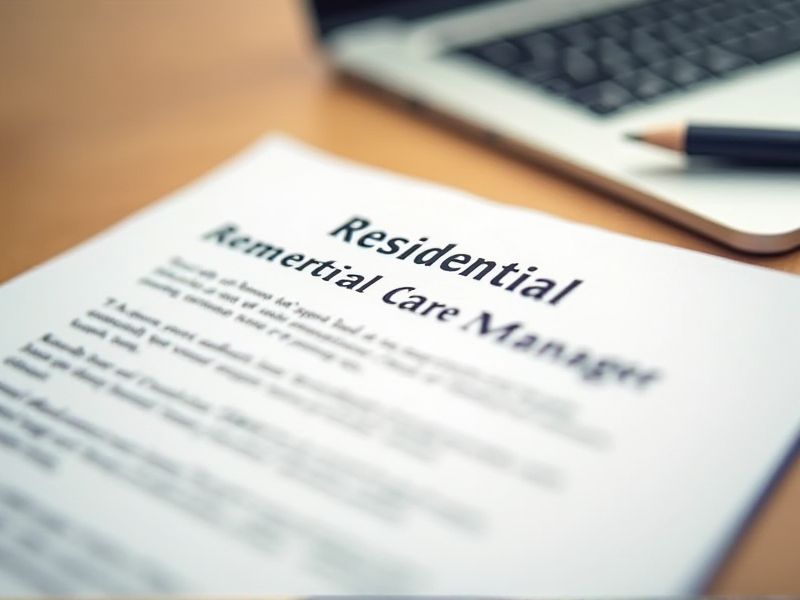
As the complexities of residential care continue to evolve, managers in this field must stay ahead with specialized knowledge to ensure quality service and meet regulatory standards. Certifications equip these managers with necessary skills, enhance credibility, and foster better decision-making in dynamic environments. They also demonstrate a commitment to professional development and adherence to industry benchmarks. Below are key certifications that might be essential for a Residential Care Manager.
Residential Care Administrator License
The requirement for a Residential Care Administrator License ensures that managers have the necessary knowledge and skills to provide quality care. This license enforces adherence to state regulations and standards, reducing potential legal and safety issues. The licensing process typically involves education and training, which equips administrators to handle complex medical and administrative tasks. Possession of this license often fosters trust among residents and their families, enhancing the facility's reputation.
Certified Assisted Living Administrator (CALA)
Certified Assisted Living Administrators (CALAs) possess specialized knowledge in elder care regulation and management, ensuring compliance with state laws and standards in residential care settings. Their expertise in financial oversight helps maintain the economic stability and sustainability of assisted living facilities. With skills in staff management and leadership, CALAs enhance workforce efficiency, improving overall care quality for residents. Their understanding of healthcare and safety protocols reduces risks and enhances the wellbeing of residents in the facility.
Certified Nursing Home Administrator (CNHA)
The complexity of regulations and standards in nursing homes necessitates a Certified Nursing Home Administrator (CNHA) to ensure compliance and improve care quality. CNHAs possess advanced training in leadership and operational management, which enhances the efficiency of residential care facilities. Their expertise aids in strategic planning and resource allocation to meet the varied needs of residents effectively. CNHAs contribute to creating a safe and supportive environment, which is crucial for the physical and emotional wellbeing of elderly residents.
Certified Dementia Practitioner (CDP)
A Certified Dementia Practitioner (CDP) is essential for a Residential Care Manager because it ensures they have specialized knowledge in managing and understanding dementia-related behaviors and care needs. This certification enhances the quality of care provided to residents with dementia, significantly improving their well-being and quality of life. CDP credentialing equips managers with effective strategies to train staff in addressing complex dementia challenges. The presence of a CDP in a leadership role can lead to better communication with families, fostering trust and understanding about the care process.
Certificate in Long-Term Care Management
A Certificate in Long-Term Care Management equips a Residential Care Manager with specialized knowledge to address the complex needs of elderly residents effectively. Regulatory compliance in residential care facilities necessitates an understanding of intricate policies, which the certificate program covers comprehensively. Enhanced management skills obtained from such a program lead to improved operational efficiencies and resident satisfaction. Professional credibility and career advancement can be significantly boosted by having specialized training in long-term care management.
Certified Care Manager (CCM)
Having a Certified Care Manager (CCM) ensures that the Residential Care Manager possesses a validated level of expertise in managing complex care needs. This certification demonstrates a commitment to ongoing education, which directly improves the quality of care provided to residents. CCMs often bring a comprehensive understanding of regulatory compliance and healthcare standards, reducing risk of errors and liabilities for the facility. They can enhance coordination with healthcare providers, resulting in more effective care plans and better health outcomes for residents.
Certified Professional in Healthcare Quality (CPHQ)
A Certified Professional in Healthcare Quality (CPHQ) equips a Residential Care Manager with advanced understanding of healthcare standards, leading to improved care quality and safety for residents. The certification enhances the manager's ability to analyze data and implement effective quality improvement initiatives, which directly impacts resident satisfaction and outcomes. With CPHQ, managers can effectively lead compliance with regulatory requirements, which reduces the risk of legal issues for the facility. The credential demonstrates a commitment to excellence, fostering trust among residents and their families, and strengthening the facility's reputation as a high-quality care provider.
Certified Medication Technician (CMT)
Certified Medication Technicians (CMTs) ensure that residents receive their medications safely and on time, reducing the risk of medication errors. Their presence allows Residential Care Managers to focus on broader facility operations and resident care planning. CMTs bring specialized knowledge that supports adherence to healthcare regulations and improves resident health outcomes. Employing CMTs enables more efficient delegation of responsibilities, enhancing the overall quality of care in residential settings.
Gerontology Certification
A Gerontology Certification equips a Residential Care Manager with specialized knowledge about the aging process, enabling better care for elderly residents. Understanding age-related health issues enhances decision-making in personalized care plans. The certification also demonstrates a commitment to professional development, which can elevate a facility's reputation. With advanced skills, these managers improve resident satisfaction and compliance with industry standards.
Certified Aging Services Professional (CASP)
A Certified Aging Services Professional (CASP) brings specialized knowledge that enhances the quality of care and services provided to elderly residents. This expertise ensures compliance with regulations and best practices, minimizing risks and improving operational efficiency in residential care settings. CASP training equips managers with skills to effectively handle the complexities of aging-related issues, from health care needs to emotional and social support. By having a CASP-certified manager, residential care facilities demonstrate a commitment to excellence, which can improve resident satisfaction and trust among families.
Summary
By obtaining certifications, you will likely enhance your skills and knowledge in managing residential care facilities. Certified managers often experience increased job opportunities and improved salary prospects. Certifications can also provide a competitive edge, distinguishing you from non-certified peers. The improved credibility and expertise may lead to heightened trust from residents and staff, fostering a more efficient and harmonious care environment.
